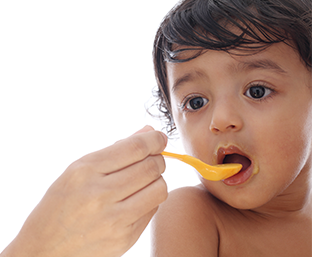

Breastfeeding should be promoted and encouraged due to the immunological, physiological, economic, social, and sanitary benefits it provides to both mother and newborn. Breastfeeding is the greatest kind of nourishment for the first six months.
Recommended dietary guidelines during lactation
1. Energy:
a. An addition of 600Kcal for the first six months postpartum and 500Kcal for the next six months (six to twelve months postpartum) is recommended.
b. You can meet the requirement by adding one extra serving of cereal (½ cup rice/1 chapati/1½ bread slice) or pulse (½ cup dal/1 cup sambar/¼ cup sprouts).
2. Protein:
a. Protein intake should be increased during lactation.
b. An addition of 17 to 20g of protein per day is required along with basic requirements.
c. This can be achieved by consuming eggs, meat, cereals, pulses, nuts, milk, and milk products.
3. Adequate intake of vitamins and minerals to be consumed.
If a person is vegetarian or vegan, discuss with the health care provider about nutritional supplements to consume. Some important nutrients are vitamin D3, vitamin B12, iron, zinc, calcium and DHA.
Care to be taken during breastfeeding:
- If weight loss is more during the first three months postpartum, energy intake should be increased to maintain the healthy weight of the mother.
- Vitamin D intake is important, as breastmilk will be the only source for the infant. This can be achieved by consuming eggs, mushrooms, and early morning sunlight exposure for both baby and mother.
- Women who are at risk of delayed onset of lactogenesis-2 require particular attention and assistance from healthcare providers during the first week postpartum. Frequent feeding is advised to establish the routine.
- When an Individual is breastfeeding the newborn, they should not be on any calorie deficit or weight loss diets. Post-weaning stage of the baby, weight management should be thought of for the mother.
- Only after discussion with the health care provider, postpartum exercise should be started. If the intensity of exercise is high, then extra addition of energy is required when breastfeeding.
- Lactating mothers should avoid consuming food contaminated with high mercury like seafood. Avoid consuming raw fish, raw eggs, raw meat, and raw dairy products, as uncooked food can cause infections.
- Consumption of coffee and tea should be restricted to not more than two cups per day.
- During breastfeeding, the use of alcohol should be avoided.
- Medications are to be consumed only on a prescription and after discussion with the healthcare provider.
Reference
- ITextbook of Human Nutrition. By Mahtab S Bamji, Kamala Krishnaswamy, GNV Brahmam
- Kominiarek, Michelle A.; Rajan, Priya (2016). Nutrition Recommendations in Pregnancy and Lactation Medical Clinics of North America, 100(6), 1199–1215. doi:10.1016/j.mcna.2016.06.004
- Guidelines from NIN ICMR, WHO.




